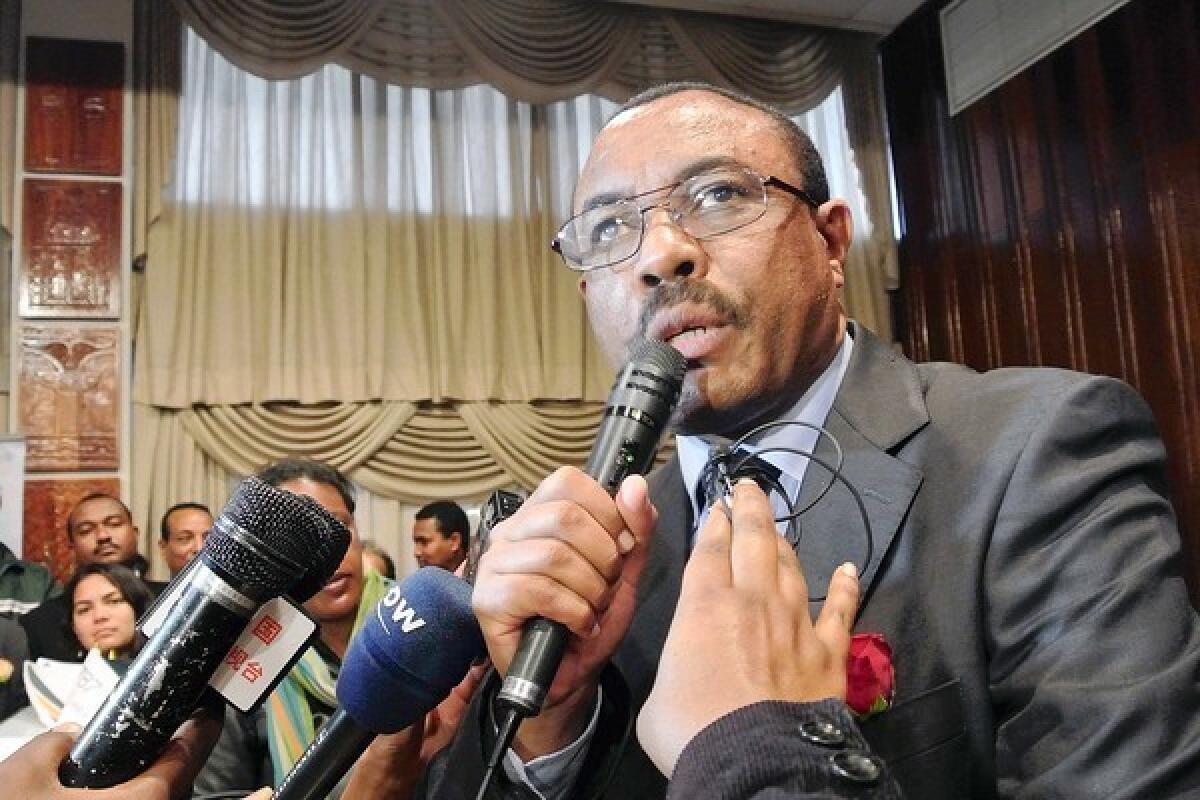Ethiopia to continue late leader’s fight against militants

JOHANNESBURG, South Africa — Washington relied for years on Ethiopian Prime Minister Meles Zenawi to help crush Islamist terrorist groups in the volatile Horn of Africa.
But now the charismatic strongman is gone and America’s immediate concern is whether the regional fight against Al Qaeda-linked groups such as the Shabab in Somalia will drift and lose its way.
Meles died late Monday after an illness that the country’s leadership had kept secret for months. Ethiopian officials were at pains Tuesday to reassure the world that there would be no major policy deviations or power vacuum.
“I assure you everything is stable and everything will continue as chartered by the prime minister,” government spokesman Bereket Simon said.
Meles’ deputy, Hailemariam Desalegn, will serve as acting prime minister, and many analysts predict he will emerge as the ruling party’s chosen successor.
Although Meles’ lengthy illness meant he had time to plan a smooth succession in Ethiopia, his demise deprives the U.S. of its closest counter-terrorism ally in the region, a man Washington knew could get things done.
Ethiopia’s military drive against Islamic radicals won’t change, analysts predict, nor will its forces pack up and leave Somalia, where they are fighting the Shabab.
“Clearly he played a leading role in the [American] regional security policy in the Horn of Africa and probably, along with [Ugandan President] Yoweri Museveni, he was the closest U.S. ally in the region,” said Patrick Smith, editor of the analytical journal Africa Confidential. Smith predicted that Ethiopia’s military and ruling party leadership would not change tack on hitting Islamic extremists hard.
“They’re absolutely agreed that Ethiopia should be in Somalia and they should go in and out of Somalia when they feel like it. And that is not going to change with Meles’ death,” he said.
Former U.S. Ambassador David H. Shinn said Meles’ death raised concerns in Washington because the longtime leader made Ethiopia a linchpin of security in a highly volatile region.
“I think the U.S. has a good relationship with the deputy prime minister, Hailemariam Desalegn, who has at least temporarily been named prime minister,” said Shinn. “Even if he doesn’t end up in that position, I think the relationship will continue pretty much as before.”
Meles, a former rebel fighter, took power after helping overthrow the communist military regime of Mengistu Haile Mariam in 1991. In Meles’ more than two decades in power, opposition leaders and journalists were harassed and jailed, and independent voices of dissent were ruthlessly crushed. Hundreds were killed in a crackdown after the 2005 election, when the opposition made significant gains, and since then Meles had strategically silenced his opponents.
Human Rights Watch described Ethiopia under Meles as essentially a single-party state, after his government’s “five-year strategy of systematically closing down space for political dissent and independent criticism.”
In July, well-known Ethiopian blogger Eskinder Nega was sentenced to 18 years in prison on terrorism charges.
But on Tuesday, President Obama praised Meles for his desire to lift Ethiopians out of poverty and provide food security.
“I am also grateful for Prime Minister Meles’ service for peace and security in Africa, his contributions to the African Union and his voice for Africa on the world stage,” Obama said in a statement.
Meles was a workaholic who built his country of 84 million into a regional power with a strong economy, years of double-digit growth, and one of the largest and strongest armies on the continent. Capable of driving his agenda through sheer force of personality, and defusing hostility between dangerous rivals such as Sudan and South Sudan, Meles was one of the few regional figures viewed by both sides as neutral.
Shinn said one risk that Meles’ demise raised was that Islamic extremists in Somalia might perceive Ethiopia to be weakened and overplay their hand militarily.
“In Somalia there are a few comments coming out from extremists that Ethiopia will now fall apart and disintegrate. I think this is nonsense, but if the Somali extremists actually believe that, they might do something very dumb, something fairly dramatic militarily, because they have misjudged the situation,” Shinn said. “It would fail miserably, in my view.”
Jason Mosley, a Somalia analyst at the London-based think tank Chatham House, said that under Meles, Ethiopia was often mischaracterized as a U.S. proxy, when it was actually pursuing its own security interests. In 2006 Ethiopia invaded neighboring Somalia to topple the Islamic Courts Union, a religious alliance that drove the country’s warlords from power and took control. The U.S. supported the invasion, concerned that some ICU figures were associated with Al Qaeda. Ethiopia withdrew in 2009 but invaded Somalia again late last year to tackle the Shabab, an offshoot of the ICU.
The U.S. flies drones from bases in Ethiopia and Djibouti, using them to spy on and sometimes attack militants.
Former opposition leader Merera Gudina on Tuesday called on the ruling party to liberalize and allow political dissent.
Merera said the ruling Ethiopian People’s Revolutionary Democratic Front “should open up the political space and build trust among the political forces in the country, as many groups in the nation have been asking for a change for many years now.”
Human Rights Watch and Amnesty International also called on Ethiopia’s new leadership to abandon its repressive policies.
But Smith, the journal editor, said the government was more likely to crack down on dissent than to liberalize in coming months.
“I think the regime is going to feel pretty vulnerable without this grand strategist. I think there will be a clampdown,” he said. “I would not see any early liberalization.”
Analysts depicted Meles as a towering, strategic thinker in the African Union whose death leaves a gap others will struggle to fill.
Mehari Taddele Maru of the Addis Ababa office of the Institute for Security Studies said Meles would be missed as an influential force in the region and an adroit diplomat capable of defusing tensions, particularly between Sudan and South Sudan, countries that tilted precipitously toward war this year.
“I think there will be serious implications in terms of the balancing role he has played in the Horn of Africa,” Mehari said. “I think the impact will be severely felt. In the African Union, he has been a sort of de facto chairman on major issues. There are other countries that are more powerful, but his role was important because of his personality and his ideas.”
Special correspondent Marthe Vanderwolf in Addis Ababa, Ethiopia, contributed to this report.
More to Read
Start your day right
Sign up for Essential California for news, features and recommendations from the L.A. Times and beyond in your inbox six days a week.
You may occasionally receive promotional content from the Los Angeles Times.






